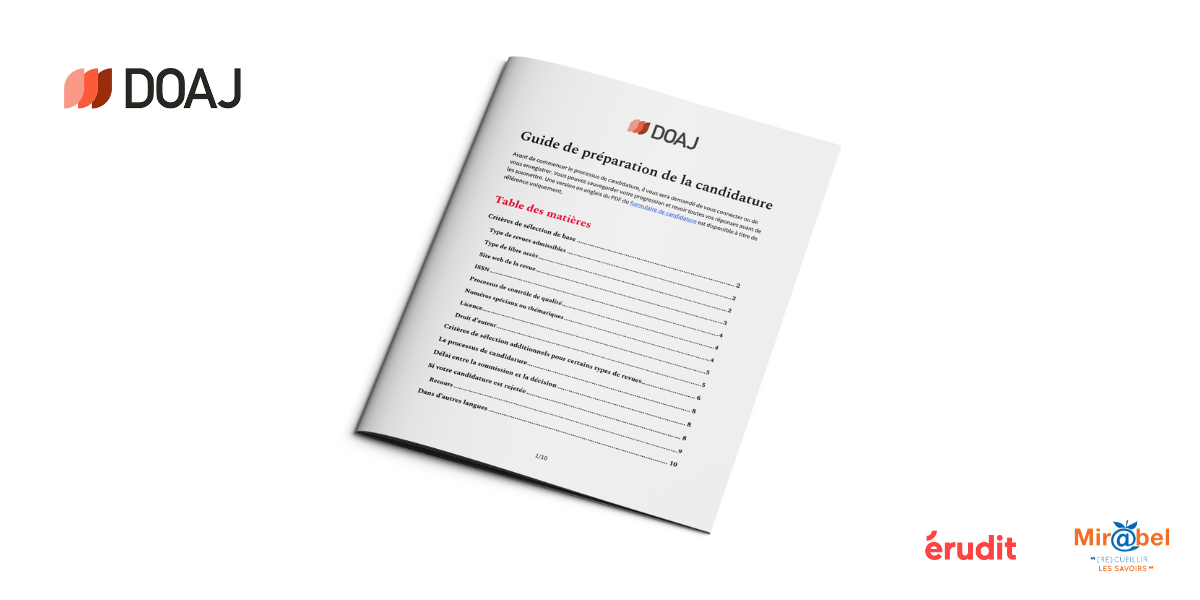
A collaboration between Mir@bel and Érudit, the French translation of the DOAJ membership documentation will help to promote French-language scholarly journals published in open access.
The DOAJ (Directory of Open Access Journals) is an international reference for peer-reviewed open access journals. As of today, more than 20,000 journals, from 134 countries and in 80 languages, are indexed in its database. As such, it contributes to the reach of more diverse research, as much on a regional level as from a linguistic perspective.
“From its launch in 2003, DOAJ has always had the ambition of being truly interdisciplinary and global in terms of geography, language, and scope. With all the DOAJ data being harvestable for free, including approximately 10 million pieces of article metadata, we give even the smaller journals global visibility. The data is picked up by organizations, leading search engines and discovery services all over the world, and we facilitate that by making it available in multiple ways.”, says Dominic Mitchell, Operations Manager at DOAJ.
The DOAJ’s mission is to increase the visibility, accessibility, reputation, use and impact of high-quality peer-reviewed open access scholarly journals, independently of research field, geography or language. To that end, the DOAJ provides a repository of open access journals who follow good editorial practices. A journal looking to be added to the repository must submit an application to the DOAJ, which is then reviewed based on selection criteria that focus on the quality of the journal’s editorial practices, rather than the content of its articles.
“It is important that journals benefit from documentation which is as exhaustive as possible when submitting their application to the DOAJ,” explains Mathieu Pigeon, data analyst at Érudit. “By providing a French-language version of this documentation, we hope to support French-language journals looking to be included on this platform, which provides essential discoverability for scholarly publications.”
The inclusion of a scholarly journal into the DOAJ constitutes a recognition of the quality of its editorial practices as well as its adherence to open access norms. Indeed, the best practices recognized by the DOAJ are aligned with the principles promoted by the major players in open access. Moreover, with 23 million visits in 2023, the DOAJ helps increase discoverability and readership for the journals included in its repository.
Further, as it was highlighted recently during the 5th anniversary celebrations of the Helsinky Initiative, it is essential that research be made accessible in a variety of languages. Initiatives like the DOAJ which support multilingualism are therefore incredible opportunities to shore up linguistic diversity in the world of scholarly publication. By providing French translations of the membership documentation, Érudit and Mir@bel are backing this movement.
“The collaboration between Érudit, the DOAJ, and Mir@bel helps support French-language scholarly journals when it comes to indexing and international visibility. All the Mir@bel2022 project partners are delighted by the outcome!” adds Sophie Fotiadi, network coordinator for Mir@bel.
The work done to translate the documentation was made possible by the participation of several publishing and library professionals. We would like to thank them here:
- Daniel Battesti, MSH Dijon, CNRS/uB, Médici (“Droit d’auteur” workgroup)
- Cécile Beauchamps, Presses universitaires de Caen, Médici (“Droit d’auteur” workgroup)
- Vincent Chollier, Lyon 2 – Prairial
- Marie-Eve Dugas, Érudit
- Mathieu Pigeon, Érudit
- Paulin Ribbe, Mir@bel, Sciences Po Lyon
- Armelle Thomas, MSH Dijon, CNRS/uB
This collaboration has led to discussions about the transposition of legal concepts and the adaptations needed for concrete case studies used as examples. In the next stages, and in collaboration with the DOAJ team, we will continue to work on clarifying these texts to help French-language journals benefit from them as much as possible.
Nous vous invitons ainsi à découvrir la documentation en français du DOAJ.